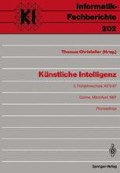Zusammenfassung
Diese Arbeit enthält die Darstellung der wichtigsten nichtmonotonen Logiken. Kenntnisse der klassischen Prädikatenlogik erster Ordnung werden dabei vorausgesetzt. Der Leser wird bemerken, daß dem Untertitel „einführender Überblick“ in nicht ganz einheitlicher Weise Rechnung getragen wird. Um den Umfang der Arbeit nicht zu sprengen, ist an einigen Stellen zugunsten der Vollständigkeit des Überblicks etwas vom Charakter einer Einführung abgewichen worden. Ich hoffe, daß es mir gelungen ist, das auf einige nicht so grundlegende Stellen zu beschränken. Ich möchte ausdrücklich darauf hinweisen, daß eine solche Arbeit die Lektüre der Originalarbeiten nicht ersetzen, sondern erleichtern soll.
Access this chapter
Tax calculation will be finalised at checkout
Purchases are for personal use only
Preview
Unable to display preview. Download preview PDF.
Literaturverzeichnis
Brewka, Gerhard: Tweety -Still Flying: Some Remarks on Abnormal Birds, Applicable Rules and a Default Prover, Proc. AAAJ-86,1986
Brewka, Gerhard: The Logic of Inheritance in Frame Systems, Proc. IJCAI 87,1987
Brewka, Gerhard, Wittur, Karl: Nichtmonotone Logiken, Universität Bonn, Informatik Berichte 40,1984
Doyle, Jon: A Truth Maintenance System, Artificial Intelligence 12,1979
Etherington, David W.: Reasoning With Incomplete Information, University of British Columbia, Vancouver, Dep. of Computer Science, Technical Report 86–14,1986
Etherington, David W.: A Semantics for Default Logic, Proc. IJCAI 87, 1987
Etherington, David W.: Relating Default Logic and Circumscription, Proc. IJCAI 87,1987
Etherington, David W.: Formalizing Nonmonotonic Reasoning Systems, Artificial Intelligence 31,1987
Etherington, David W., Mercer, Robert, Reiter, Raymond: On the Adequacy of Predicate Circumscription for Closed-World-Reasoning, Proc. AAAI-Workshop Non-Monotonic Reasoning, 1984
Goodwin, James W.: A Theory and System for Non-Monotonic Reasoning, Linköping University, Computer and Information Science Dep., Dissertation No. 165,1987
Halpern, J., Moses, Y.: Towards a Theory of Knowledge and Ignorance: Preliminary Report, IBM Research Laboratory, San Jose, 1984
Hanks, Steven, McDermott, Drew: Default Reasoning and Temporal Logics, Proc. AAAI 86, 1986
Hanks, Steven, McDermott, Drew: Nonmonotonic Logic and Temporal Projection, Artificial Intelligence 33,1987
Hewitt, C.E.: Description and Theoretical Analysis (Using Schemata) of PLANNER: a Language for Proving Theorems and Manipulating Models in a Robot, MIT AI Lab., TR-258,1972
Hughes, G.E., Cresswell, M.J.: An Introduction to Modal Logic, Methuen, London, 1968
Imielinski, T.: Results on Translating Defaults to Circumscription, Proc. UCAI85,1985
Konolige, Kurt: On the Relation Between Default Theories and Autoepistemic Logic, Proc. IJCAI 87,1987
Lifschitz, Vladimir: Some Results on Circumscription, Proc. AAAI-Workshop Non-Monotonic Reasoning, 1984
Lifschitz, Vladimir: Closed-World Databases and Circumscription, Artificial Intelligence 27,1985
Lifschitz, Vladimir: On the Satisfiability of Circumscription, Artificial Intelligence 28,1986
Lifschitz, Vladimir: Rules for Computing Circumscription, in preparation
Lukaszewicz, W.: Two Results on Default Logic, Proc IJCAI 1985, 1985.
McCarthy, John: Circumscription -A Form of Nonmonotonic Reasoning, Artificial Intelligence 13,1980
McCarthy, John: Applications of Circumscription to Formalizing Common Sense Knowledge, Proc. AAAI-Workshop Non-Monotonic Reasoning, 1984 (also in Artificial Intelligence 28,1986)
McDermott, Drew: Nonmonotonic Logic II: Nonmonotonic Modal Theories, JACM 29(1), 1982
McDermott, Drew: A Critique of Pure Reason, Yale University, Computer Science Dep., Research Report 480,1986
McDermott, Drew: AI, Logic and the Frame Problem, Proc. AAAI-Workshop The Frame Problem in Artificial Intelligence, 1987
McDermott, Drew; Doyle, Jon: Nonmonotonic Logic I, Artificial Intelligence 13,1980
Moore, Robert C: Semantical Considerations on Nonmonotonic Logic, Artificial Intelligence 25,1985 (short Version in Proc. IJCAI 83)
Moore, Robert C: Possible-World Semantics for Autoepistemic Logic, Proc. AAAI-Workshop Non-Monotonic Reasoning, 1984
Mott, Peter L.: A Theorem on the Consistency of Circumscription, Artificial Intelligence 31,1987
Minker ,Jack; Perlis, Donald: Protected Circumscription, Proc. AAAI-Workshop Non-Monotonic Reasoning, 1984
Perlis, Donald: Circumscribing with Sets, Artificial Intelligence 31,1987
Perlis, Donald; Minker, Jack: Completeness Results for Circumscription, Artificial Intelligence 28,1986
Reinfrank, Michael: Reason Maintenance Systems, erscheint in: H. Stoyan (Hrsg.): Proc. Workshop on Truth Maintenance Systems, Berlin 86, Springer, 1987
Reiter, Raymond: A Logic for Default Reasoning, Artificial Intelligence 13, 1980
Reiter, Raymond; Criscuolo G.: On Interacting Defaults, Proc. IJCAI1981
Shoham, Yoav: Reasoning About Change: Time and Causation from the Standpoint of Artificial Intelligence, Ph.D. Thesis, Yale University, 1986
Shoham, Yoav: Nonmonotonic Logics: Meaning and Utility, Proc. IJCAI 87, 1987
Author information
Authors and Affiliations
Editor information
Editors and Affiliations
Rights and permissions
Copyright information
© 1989 Springer-Verlag Berlin Heidelberg
About this paper
Cite this paper
Brewka, G. (1989). Nichtmonotone Logiken Ein einführender Überblick. In: Christaller, T. (eds) Künstliche Intelligenz. Informatik-Fachberichte, vol 202. Springer, Berlin, Heidelberg. https://doi.org/10.1007/978-3-642-83739-5_7
Download citation
DOI: https://doi.org/10.1007/978-3-642-83739-5_7
Publisher Name: Springer, Berlin, Heidelberg
Print ISBN: 978-3-540-50884-7
Online ISBN: 978-3-642-83739-5
eBook Packages: Springer Book Archive

